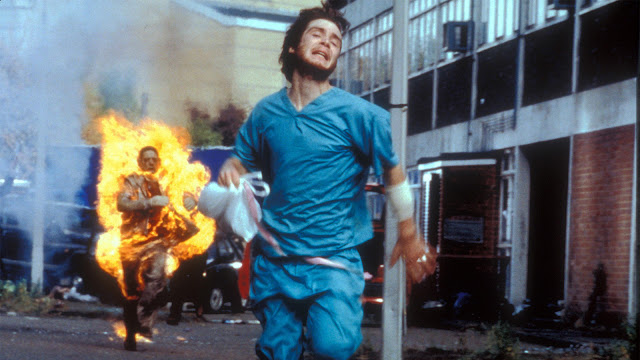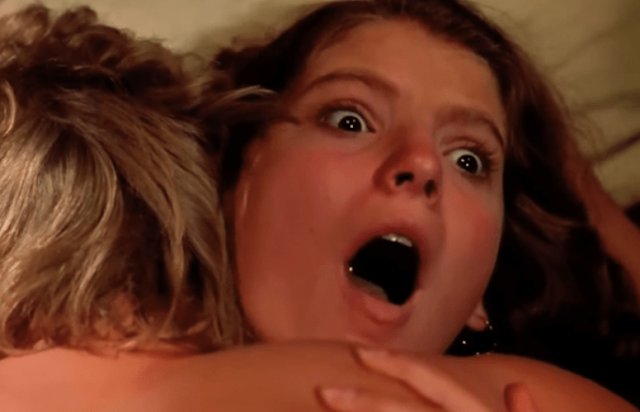The five most common zombie movie tropes
This year zombie films are having a renaissance. So far we've had Cargo, The Cured and Netflix original Ravenous. What do all these films have in common? Well, it turns out an awful lot actually.
Zombies have been a cultural obsession since George A. Romero's Night of the Living Dead (1968). The subgenre has taken a few left turns since that unbearably tense undead seige on a rickety house. Now zombie flicks tend to be large-scale gorefests which mercilesslessly pluck the heartstrings as our beloved protagonists become flesh-eating maniacs.
Danny Boyle's 28 Days Later zombies were famously super fast. They unnervingly caught on: we'd almost certainly be screwed in a life-or-death sprint with the zombies from Charlie Brooker's Dead Set (2008) or Amazon Prime's sleeper hit Train to Busan (2016). Now TV series The Walking Dead and Fear the Walking Dead ensure our favourite lumbering corpses remain a mainstay in popular culture.
If you think about it, most zombie films really are quite similar. We have thought about it. Naturally.
So, without further ado, strap in as we share the recipe to cook up a flesh-feast fit for an undead horde. It's time to round up those zombie tropes!
1) Start with a eerily abandoned urban setting
Naturally everyone either is a zombie or is currently being eaten by a zombie. Rats!
What's going to happen next: Zombies. Lots of zombies,
Likely to: Create some lovely, tense scene-setting
Danger of: Sleep deprivation. Boyle and co. had to shoot at 3am for the scenes in a deserted Westminster. Eek!
2) Add masses of flesh-eating zombies. Not just a few zombies. Lots of zombies
Less is never more in the zombie subgenre.
What happens next: Nothing good
Likely to: Lead to a deep-seated feeling of hopelessness
Danger of: Drowning us in mindless spectacle (ahem, World War Z)
3) Season with a plucky gang of survivors. Preferably family or close friends. 80% of them will die horribly.
Yes, someone's going have to shoot their zombified partner/child/bezzie/dog. And they're going to act the hell out of it. Extra points if the hero gets to sacrifice themselves.
What happens next: Everyone promptly forgets that their loved one has been unceremoniously butchered
Likely to: Redeem an arsehole protagonist (a la Train to Busan). Have you praying for characters to just hurry up and shoot their soulmate through the head before it's too late!
Danger of: Too much and it just gets silly
4) Stir the mixture in a "safe place". It's not safe. Not remotely safe.
This temporary sanctuary for the surving characters is often compromised through an act of sheer idiocy. Joplin letting all the zombies into the Big Brother house in Dead Set – why would you do that?
What happens next: The completely avoidable deaths of all or most of the protagonists
Likely to: Make you shout unsociably at the screen, cursing the character's poor decision-making. You'd obviously do much better in the zombie apocalypse.
Danger of: Bizarre choices that are inconsistent with what we know of the characters / normal human behaviour. There's a moment in Train to Busan where a minor character just thinks "fuck it" and lets the zombies massacre herself and everyone else in the train carriage. Just why?
5) Finish with the realisation that humans were the real monsters all along
You'd think with the zombies and everything we'd all come together and help each other out. Evidently not!
What happens next: Some deep but vague lessons about humanity
Likely to: If done well, as in the final scene of Night of the Living Dead (shown above), it can be deeply shocking
Danger of: Confusion over what exactly the film is trying to tell us
Subgenres within subgenres!
Naturally there are some deeply odd variants on your common zombie flick. These include:
The Zomcom
What's the story: Hilarious knockabout fun featuring bags of gore and goofy, loveable characters
Examples: Shaun of the Dead, Zombieland, The Santa Clarita Diet, iZombie
Political zombies
What's the story: Zombies are a metaphor for minority groups suffering from violent prejudices. Most often they're "cured" and society is having a tough time forgiving them
Examples: In The Flesh, The Cured
Romantic zombies
What's the story: The less said about this the better
Examples: Warm Bodies
Fill your Twitter feed with witty horror banter. Follow us:Follow @GoreConnoisseur







Comments
Post a Comment